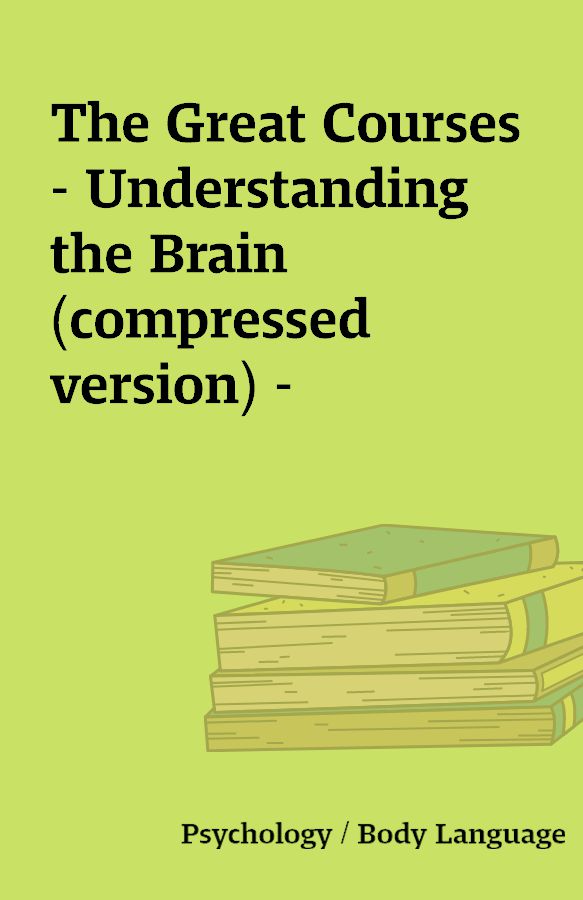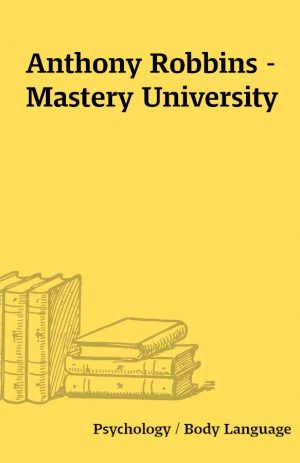The Great Courses – Understanding the Brain (compressed version) –
TTC Video (compressed) – Understanding the Brain
[DVD – 36 AVIs]
Description
The Great Courses – Understanding the Brain (Compressed Version)http://www.thegreatcourses.com/tgc/courses/Course_Detail.asp…36 Lectures (30 minutes / lecture)As you read this, your brain is alive with a flurry of activity, including:* directing the movement of your eyes* decoding the electrical impulses from your retina* recognizing the pattern of words and phrases and extracting their meaning* controlling your breathing, heart rate, and body temperature* adjusting your posture* screening out the buzz of background stimuliEverything that goes on inside your body and every interaction you have with the outside world is controlled by your brain. It allows you to cope masterfully with your everyday environment. It is capable of producing breathtaking athletic feats, sublime works of art, and profound scientific insights. It also produces the enormous range of emotional responses that can take us from the depths of depression to the heights of euphoria.Considering everything the brain does, how can this relatively small mass of tissue possibly be the source of our personalities, dreams, thoughts, sensations, utterances, and movements?Understanding the Brain, a 36-lecture course by award-winning Professor Jeanette Norden of Vanderbilt University School of Medicine, takes you inside this astonishingly complex organ and shows you how it works, from the gross level of its organization to the molecular level of how cells in the brain communicate. With its combination of neurology, biology, and psychology, this course will help you understand how we perceive the world through our senses, how we move, how we learn and remember, and how emotions affect our thoughts and actions.Solving the Mystery of the BrainThe ancient Egyptians discarded the brain during mummification while carefully preserving other organs; to them, the brain was of no importance. Starting with the Greek physician Hippocrates, however, observers began tracing more and more of our sensory, nervous, and intellectual activities to the brain—and eventually to specific regions of the brain.The brain is still a mystery in many respects—for example, we still are unsure as to how consciousness is generated—but recent decades have seen unparalleled advances in understanding how the brain does what it does. In the last 50 years, an explosion of knowledge about the brain’s structure and function has occurred. Scientists have performed amazing research by using tools such as MRIs and PET scanning to get a better grasp on deciphering the mysteries of how this important organ works.Due to these technological advances, we can now pinpoint:* where light that enters the eye is converted into the subjective experience of sight* where pressure waves that reach the ear are processed into sound* where fear is generated* which areas of the brain are involved in spoken and written language* where the deep chemistry of love is kindledKnow Your Mind We now know that something important is always going on inside our brain and, as Understanding the Brain illustrates, if you know what to look for, you can observe specific aspects of your own brain in action:* Vision: The “now you see it, now you don’t” feeling you get when you see an illusion is your brain trying to interpret raw data from the eyes. Far from taking a picture of the world and sending it to the brain, the eyes actually transmit very little information; “seeing” is a creation of the brain.* Thought: Sometimes, you can have trouble thinking after taking an antihistamine. This is because antihistamines do not just combat the effects of an allergy, they also block histamine as a neurotransmitter in the brain, altering your ability to think and process information.* Motor skills: When you learn how to walk, ride a bicycle, knit, dance, or perform some other motor skill, you reach a point where all of a sudden you are able to coordinate the new movement. That is because specialized neurons in your brain’s cerebellum are now firing in sequence.* Emotion and memory: Think about doing your taxes. Does that thought elicit a particular emotion? We do not just remember something; our memories are colored with emotion. All of our experiences are influenced by previous experiences through complex loops in the brain’s limbic system.* Social bonding: Your feeling of well-being with your spouse or friends has a neurochemical basis. The neurotransmitter oxytocin is found in very high concentrations in the limbic systems of animals that bond socially.* Consciousness: Sometimes, you can arrive at work with very little memory of the details of your journey; obviously you were not unconscious, but you were not fully aware either. This occurs when your brain is in “autopilot” mode—where it was in control without your being conscious of all that was happening around you.The videos in this product are comparatively of smaller size than the original which were a total of around 7 GB in size.
You must be logged in to post a review.






Reviews
There are no reviews yet.